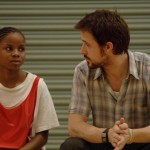Dir. by Ryan Fleck and Anna Boden
It’s rare these days when I find myself identifying with a character in the same way that, say, the 7-year-old version of me identified with Charlie Bucket or the 15-year-old version of me identified with Holden Caulfield. But Dan Dunne, the crack-addicted, idealistic History teacher played by Ryan Gosling in Half Nelson, is more like me than any other character I’ve met in quite some time. I don’t share his drug problems, fortunately, but I identify with what they represent in his life — the hypocrisy and disillusionment and isolation. (We all have our fatal flaws, right?)
What rescues Half Nelson from the trappings of Movie of the Week melodrama — and what makes it one of my favorite new films of 2006 — is the care with which Fleck and partner Anna Boden ground Dunne’s struggles in a specific historical and political context. He’s not some Everyman Teacher fighting a universal battle for the hearts and minds of Today’s Youth; he’s the child, both literally and philosophically, of the ’60s generation that fought bravely and successfully for Civil Rights and Free Speech before watching their idealism shattered by personal excess, in-fighting, the horrors of Vietnam (or their inability to stop it), creeping apathy, and, eventually, the dawning of a new “Morning in America.”
In the classroom, Dunne throws out the approved curriculum and, instead, teaches his students dialectics, forcing them to recognize the complexity — the counter-arguments, the push and pull — of every issue. As a simple echo of Dunne’s own swings between good and bad, light and dark, all the talk of dialectics is, perhaps, too easy a metaphor. But Fleck and Boden, I think, are interested in larger issues as well: the essential nature of debate for the health of a Democracy, for example, and, more specifically, the difficult but necessary intersection between idealism (even naive idealism) and pragmatism that every movement must maneuver in search of a progressive politics.
I continued writing my dissertation long after I’d lost my enthusiasm for academia and the specific texts with which I was working because I was (and still am) personally invested in the central questions of the project: How do I take this “theory” — specifically, the ideas about democracy that animated the best aspects of the American New Left — and transfer them into “action”? How do I find “praxis” at the historical moment when capitalism won? How do I fight off the cynicism of my generation and participate, in a practical and meaningful way, in a progressive movement toward goodness and justice? How do I hold onto hope when I see so little cause for it?
There’s a moment two-thirds of the way through Half Nelson when Dunne drives across town to confront Frank, a drug dealer who is angling to pull one of Dunne’s favorite students out of school and into the business. Dunne is high. He’s bought drugs from Frank (and other dealers just like him) many, many times. The right/wrong dialectic here has exploded into a dizzying miasma, and Gosling’s performance nails it. “What am I supposed to do? I’m supposed to do something, right?” he finally gasps. I didn’t know whether to cry or cheer.
